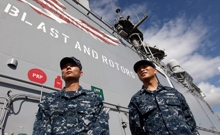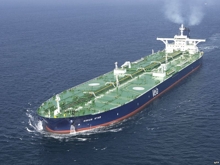China’s main foreign policy problem is that no threat nation wants to reduce it to a pathetic and weak condition. Its threat nations are not evil; they are simply pursuing their own advantages, both economic and political.
China’s main foreign opponent is the United States. The majority of China’s ruling class is well aware of that and therefore see no future in the various fancy projects, like G2, which periodically emerge from Washington.
Before the Communist Party and Mao Zedong personally took power in 1949, the interests of the Western countries and Japan were confined to plundering and exploiting China and getting it hooked on opium. The interests of the United States, the EU and Japan in China are not much different today, but China’s armed forces either block them or hinder them.
What interests do the United States and its allies have in China?
Before getting to that question, it is worthwhile mentioning the following. The Western establishment has a very simple concept of the world order and China’s place in it. A billion Red Chinese are supposed to manufacture material goods for the West for $200 a month. The so-called “Golden Billion” are free to consume the abundance of goods produced in China and other third world countries. Most people in Western countries now work in the service sector and earn $1200 a month because someone has to provide security, health and education services; work in real estate offices; and generally wait on the elite portion (a figure of 20% is usually cited) of the Golden Billion. As far as garbage collection in the streets of Western cities is concerned, guest workers from Muslim countries can take care of that important matter and do it for very little pay.
Therefore, it is not the US interests but its job as the military-political leader of the West to implement that concept and ensure that the existing world order functions smoothly.
Consequently, the recent events that I touched upon in part one of this article have been causing some confusion of late. I am referring to Prime Minister Wen Jiabao’s offer to lift the embargo on sales of Western arms to his country and his Chinese colleagues’ requests that the yuan be included in the SDR basket in exchange for providing financial assistance to the EU. The attempt by a billion Red Chinese to become part of the Golden Billion is staggering for its naïveté that borders on guileless impudence.
The job of the United States is to keep China under military, political, economic and ideological control. Chinese workers must function smoothly and rhythmically to supply half of what they produce to the West in exchange for pieces of colored paper issued by the US Federal Reserve System. They need to consume what Hollywood produces and consider the United States a beacon of freedom and prosperity.
The United States controls China by a variety of means and methods. Let’s first consider some political opportunities for keeping China in check.
The main political goal of the United States is to keep China as isolated as possible internationally, create a hostile encirclement around its perimeter and assemble an anti-Chinese military-political bloc. All this is being done as part of the “Return to Asia” doctrine.
The United States, its NATO allies, Australia (as a location for military bases), and Japan will form the basis of the future, or rather the current, anti-Chinese bloc (ACB). Washington has also been working to get the Bank of India involved. India is engaged in a long-standing feud with China that occasionally spills over into diplomatic disputes and border wars. India is a member of the “nuclear club,” and it has a space program, a mature scientific base and good prospects for challenging China in its economic niche.
The United States also maintains friendly relations with several Southeast Asian countries that are involved in conflicts with China in the South China Sea and are generally concerned about China’s military buildup in the region. Washington is currently working to establish a military-strategic partnership with Vietnam. A statement by Pentagon chief Leon Panetta this summer is apropos of that.
“Access for United States naval ships into this facility (Cam Ranh Bay) is a key component of this relationship and we see a tremendous potential here for the future… [I]t will be particularly important to be able to work with partners like Vietnam, to be able to use harbors like this as we move our ships from our ports on the West Coast, ports or stations here in the Pacific,” Panetta told reporters aboard the cargo ship Richard Byrd. Cam Ranh Bay is one of the most important strategic locations; it holds a commanding position in Southeast Asia.
Because China is becoming increasingly dependent on importing oil, one way the United States has of politically controlling it is by promoting pro-American regimes in oil importing countries or creating political instability in them. The events in Sudan are a perfect example of that.
The Chinese have invested more than $15 billion in that backward African country since 1999. In 2006, Sudan became the fourth 
That anti-Chinese orientation of US policy, which has grown markedly stronger in recent years, has nothing to do with a desire by Washington to upset the existing world order, bomb Beijing, bring full democracy to China and rid it of the communists. Not at all. On the contrary, the US government favors maintaining the current global status quo (which individual countries the State Department calls “rogue states” do not fit into) that emerged after the collapse of the USSR, and it is conscientiously striving to function as the world’s policeman.
The United States government believes China and some of its actions aimed at achieving greater independence and influence constitute a problem for world order and tranquility. A prime example is the “String of Pearls,” an obvious Chinese effort to protect its oil supply routes. To accomplish that, it needs a series of naval bases, supply depots and strongholds located along the route followed by supertankers. Not least among them are the agreements China is pursuing with Pakistan (Gwadar), Sri Lanka (Hambantonta) and Bangladesh (Chittagong), among others.
Konstantin Penzev – is an author and historian and a columnist for New Eastern Outlook.
